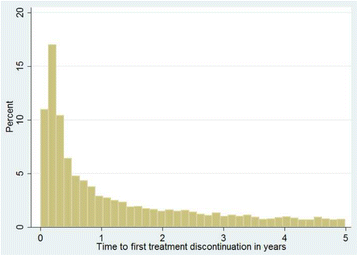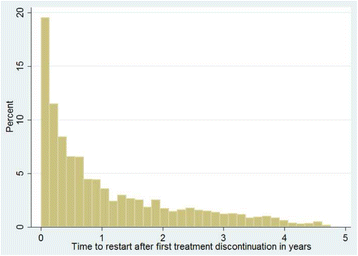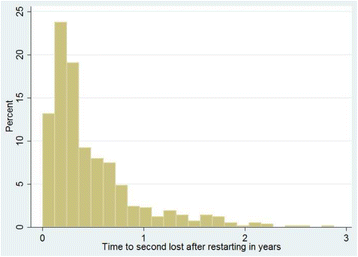Patients who restart antiretroviral medication after interruption remain at high risk of unfavorable outcomes in Ethiopia
- PMID: 28376805
- PMCID: PMC5379766
- DOI: 10.1186/s12913-017-2172-9
Patients who restart antiretroviral medication after interruption remain at high risk of unfavorable outcomes in Ethiopia
Abstract
Background: Achieving optimal adherence to highly active antiretroviral therapy (HAART) is necessary to attain viral suppression and hence optimal clinical outcome. Interruptions in antiretroviral therapy medication often occur, but a substantial proportion restart treatment. Long-term care engagement practices and clinical outcomes have not been described among cohorts of individuals on HAART in Ethiopia.
Methods: In this study we describe treatment interruption patterns over time among clients who interrupt and subsequently resume HAART, and those who are continuously engaged in treatment, and determine clinical factors associated with loss to engagement. An observational, longitudinal, retrospective cohort design was engaged, using secondary treatment program data. We analyzed differences in treatment interruption among clients who were continuously active and those that interrupted and restarted treatment at months 6, 12, 18, and 24. Cox proportional hazards regression analysis was used to identify predictors of loss from treatment. We estimated time to first treatment interruption, time to restarting after interruption, and time to second interruption. Data from all clients registered to receive HAART in ten study health facilities, from 2005 to 2014, were used to study clinical and treatment outcomes up to 60 months or study end.
Results: In this study, 39% (8,759/22,647) of clients interrupted treatment for more than 1 month at least at one point during follow-up. Of these, only 35% ever restarted treatment. At the end of follow-up, the hazard of unfavorable treatment outcome (dead, lost, stopped HAART) for clients who restarted treatment at months 6, 12, 18 and 24 was higher by a factor of 1.9, 2.4, 2.6 and 2.4, as compared to those who never discontinued treatment at those times.
Conclusion: HAART treatment interruption was common in the study population. In those with a history of treatment interruption, long term clinical outcomes were found to be suboptimal. Targeted interventions are required to address follow-up challenges and prevent treatment interruption.
Keywords: Antiretroviral medication; Ethiopia; Lost; Tracking; Treatment Outcome; Treatment interruption.
Figures
Similar articles
-
[Treatment interruption in 30 HIV-infected patients with successful viral suppression under highly active antiretroviral treatment].Presse Med. 2005 Jun 4;34(10 Suppl):1S8-13. Presse Med. 2005. PMID: 16025661 French.
-
Retrospective analysis of suspending HAART in selected patients with controlled HIV replication.AIDS Patient Care STDS. 2005 Jul;19(7):429-38. doi: 10.1089/apc.2005.19.429. AIDS Patient Care STDS. 2005. PMID: 16053400
-
Joint longitudinal data analysis in detecting determinants of CD4 cell count change and adherence to highly active antiretroviral therapy at Felege Hiwot Teaching and Specialized Hospital, North-west Ethiopia (Amhara Region).AIDS Res Ther. 2017 Mar 16;14(1):14. doi: 10.1186/s12981-017-0141-3. AIDS Res Ther. 2017. PMID: 28302125 Free PMC article.
-
Study of the impact of HIV genotypic drug resistance testing on therapy efficacy.Verh K Acad Geneeskd Belg. 2001;63(5):447-73. Verh K Acad Geneeskd Belg. 2001. PMID: 11813503 Review.
-
Predictors of treatment interruption among patients on antiretroviral therapy in Akwa Ibom, Nigeria: outcomes after 12 months.AIDS Care. 2023 Jan;35(1):114-122. doi: 10.1080/09540121.2022.2093826. Epub 2022 Jun 28. AIDS Care. 2023. PMID: 35765160 Review.
Cited by
-
The effect of care interruptions on mortality in adults resuming antiretroviral therapy.AIDS. 2024 Jul 1;38(8):1198-1205. doi: 10.1097/QAD.0000000000003859. Epub 2024 Feb 7. AIDS. 2024. PMID: 38814712 Free PMC article.
-
Stakeholder Priorities for ART Initiation and Early Retention Interventions in Malawi: A Qualitative Study Comparing International and National Perspectives.Res Sq [Preprint]. 2023 Dec 21:rs.3.rs-3725505. doi: 10.21203/rs.3.rs-3725505/v1. Res Sq. 2023. Update in: BMC Public Health. 2025 Jul 5;25(1):2388. doi: 10.1186/s12889-025-23484-8. PMID: 38196656 Free PMC article. Updated. Preprint.
-
What causes non-adherence among some individuals on long term antiretroviral therapy? Experiences of individuals with poor viral suppression in Uganda.AIDS Res Ther. 2019 Jan 21;16(1):2. doi: 10.1186/s12981-018-0214-y. AIDS Res Ther. 2019. PMID: 30665440 Free PMC article.
-
Characterizing treatment interruptions in the OPERA cohort and virologic outcomes after resumption with bictegravir/emtricitabine/tenofovir alafenamide.AIDS Res Ther. 2025 Jul 21;22(1):71. doi: 10.1186/s12981-025-00769-x. AIDS Res Ther. 2025. PMID: 40691801 Free PMC article.
-
Measuring patient engagement with HIV care in sub-Saharan Africa: a scoping study.J Int AIDS Soc. 2022 Oct;25(10):e26025. doi: 10.1002/jia2.26025. J Int AIDS Soc. 2022. PMID: 36285618 Free PMC article. Review.
References
-
- Joint United Nations Programme on HIV/AIDS . Global AIDS Response Progress Reporting (GARPR) 2016. 2016.
-
- Joint United Nations Programme on HIV/AIDS . AIDS by the numbers. 2016.
-
- World Health Organisation . Consolidated guidelines on the use of antiretroviral drugs for treating and preventing HIV infection: recommendations for a public health approach. Geneva: World Health Organisation; 2013. - PubMed
-
- WHO . Progress report 2011: global HIV/AIDS response. Epidemic uptake and health sector progress towards universal access. 2011.
-
- Bucciardini R, Fragola V, Abegaz T, Lucattini S, Halifom A, Tadesse E, Berhe M, Pugliese K, Binelli A, De Castro P. Retention in Care of Adult HIV Patients Initiating Antiretroviral Therapy in Tigray, Ethiopia: A Prospective Observational Cohort Study. PLoS ONE. 2015;10(9) doi: 10.1371/journal.pone.0136117. - DOI - PMC - PubMed
MeSH terms
LinkOut - more resources
Full Text Sources
Other Literature Sources
Medical




